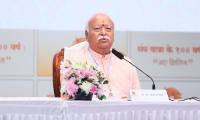The police have locked the main gate of the official residence of deposed Pakistan's supreme court chief justice Iftikhar Muhammad Chaudhry after he planned to go out of his home.
Chaudhry and 10 other judges of the apex court who did not endorse the emergency imposed by President Pervez Musharraf on November 3 had been placed under house arrest. Scores of high court judges were also sacked.
After locking the gate of Chaudhry's home in the Judges Colony in Islamabad, the police erected barbed wire barricades and parked vehicles outside to prevent him walking out of the residence.
The move came a day after interior ministry spokesman Javed Iqbal Cheema said that all the deposed judges are free to leave their homes. However, when Chaudhry tried to go out of his residence after hearing about Cheema's remarks, the police thwarted his move.
Several other sacked judges too were not allowed to come out of their homes in the Judges Colony.
Despite being under house arrest, Chaudhry has continued to defy the emergency. Addressing a meeting of lawyers over the phone shortly after the imposition of emergency, Chaudhry asked the people to rise up against the military regime. The authorities responded by jamming all mobile phones in Islamabad for several hours.
The police on Wednesday also expelled two correspondents of private television news channels from the supreme court premises, the channels said.
Dawn News and Aaj TV said their correspondents were forced to leave the apex court premises by senior police officers despite having special passes for covering the proceedings.








